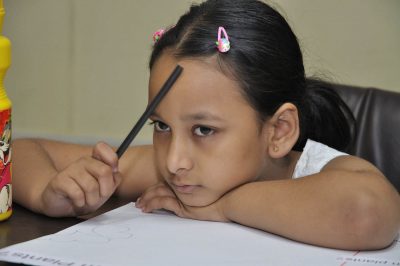
Boston University researchers will soon launch the largest-ever study on child anxiety, designed to compare face-to-face therapy with online therapy.
The five-year study will take place under the leadership of BU professors Lisa Fortuna, Donna Pincus, Michelle Porche and Jonathan Comer. Nearly 1,900 patients with mild to moderate anxiety will participate.
A unique focus of the study is patient experience, said Porche, a Wheelock College of Education and Human Development professor. The researchers will not only follow patients through the regular treatment period of eight to 12 weeks, Porche said, but also into the one- to two-year period after treatment.
The length and scope of the project will allow the research team to fully understand the effects of the differing treatments, Porche said.
“Not only do we want to see how does it work immediately over the course of treatment, … but also long-term,” Porche said. “Do children and adolescents who learn different skills in response to their feelings of anxiety, so that they can manage it, are they still using those strategies one year or two years later? Are their symptoms reduced, or [do they] stay manageable and reduced one year or two years later?”
Both types of therapy sessions, face-to-face and online, will use the same treatment, Porche said. Known as cognitive behavioral therapy, it is a type of talk therapy that teaches patients to identify and modify anxiety-producing thoughts.
By controlling the treatment offered during both therapy sessions, Porche and her research team hope to find an answer to their real research question on the differences — if any exist — between the therapy’s two delivery methods.
“What we hope to find, our hypothesis, [is] that both the face-to-face and the online version of the treatment will be equally effective,” Porche said.
The team hopes to find equal effectiveness between online and face-to-face research to solve issues of patient access, Porche said — online treatment can help people in places that are hard to reach geographically.
The study is being funded by Washington, D.C. nonprofit Patient-Centered Outcomes Research Institute (PCORI), the organization’s Associate Director of Media Relations Christine Stencel said.
Following the submission of the BU research team’s proposal, Stencel said that a team of scientists, healthcare professionals, patient representatives and other healthcare decision makers completed a review of the proposal.
Stencel said one of the essential criteria reviewed during this period was pragmatic study design, which was the selection of a broad sample of patients whose findings would be applicable to the diversity of real-world patients. This is due to the fact that in the real world, patients have different health problems, ages and living conditions, she said.
“If you really want to know how well something is going to work in everyday, real practice in hospitals and clinics and whatnot, it’d be better if you had a broader study population and you found ways to deal with that,” Stencel said.
The necessity for broad-based child anxiety research is found in unfortunate statistics, Porche said, which were one of the driving reasons behind her involvement in the study. Anxiety is the most frequently diagnosed disorder in both children and adolescents.
Research on child anxiety is necessary and urgent, Stencel said.
“[Anxiety] really affects kids, it really affects families, it affects communities,” Stencel said, “so, we felt, our reviewers and ourselves, that this proposal really addressed all the criteria we have. It was a strong proposal, and so we ultimately approved funding for it.”



